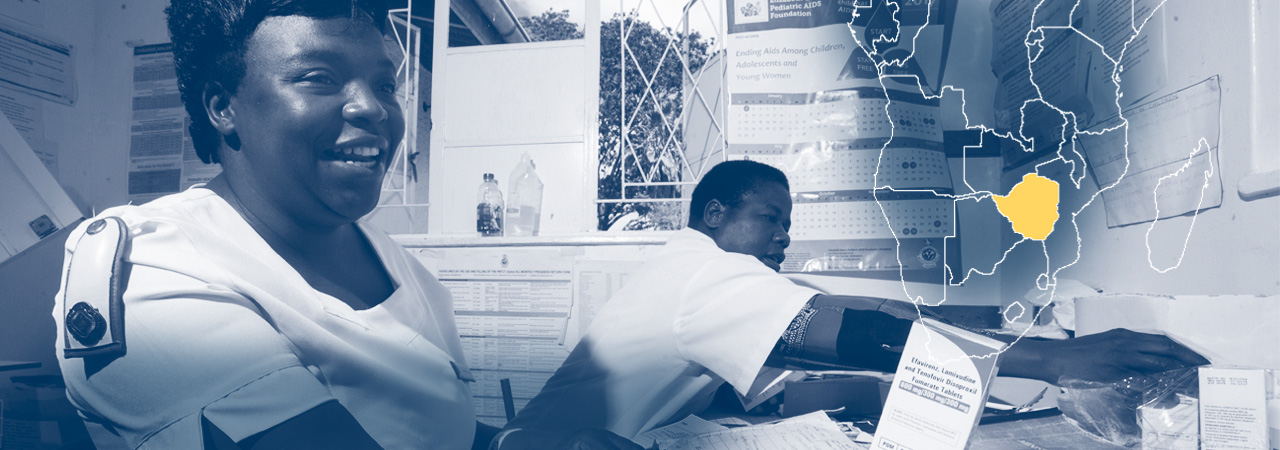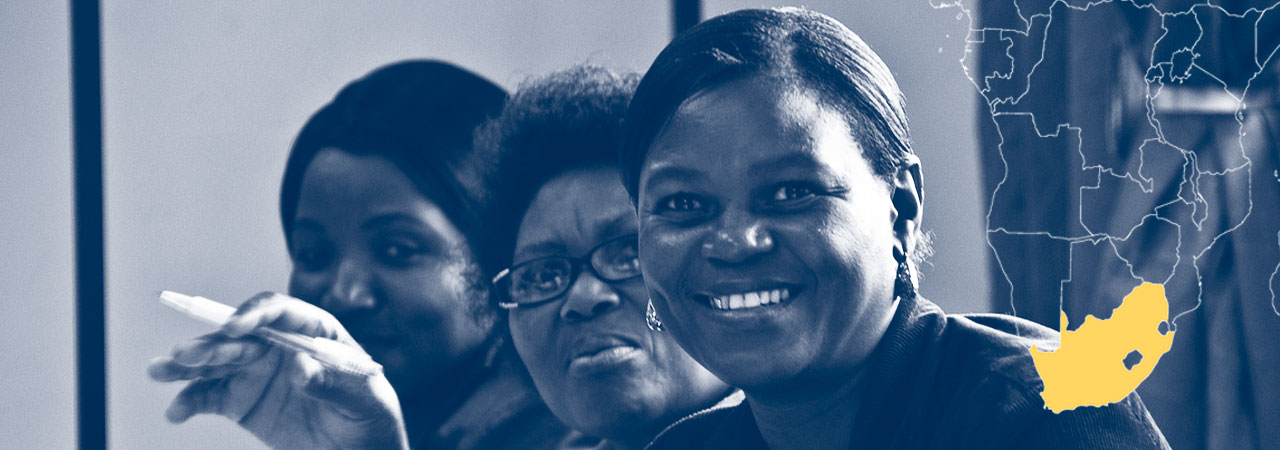Mozambique has one of the fastest growing economies in sub-Saharan Africa. Since the end of a 17-year civil war in 1992, leaders have worked to leverage country resources to build infrastructure and improve the quality of life for Mozambican citizens. Despite this promising growth, many public-sector programs are under-resourced, and much of the population still has limited access to quality health care.
With a population of 24 million, Mozambique has fewer than four physicians for every 100,000 inhabitants. More than 1.4 million people are estimated to be infected with HIV. The population also has high rates of tuberculosis and other respiratory diseases, malaria, and diarrheal diseases such as endemic cholera, all of which worsen the impact of HIV and AIDS when there is co-infection.
Drawing on expertise from its global network, including the University of Washington and the University of California, San Francisco, I-TECH began working in Mozambique in 2005. Since then, its technical support to the Ministry of Health (MISAU) has been focused on addressing the shortage of health care providers in the country through clinical training and curriculum revision and development. I-TECH also works to improve the quality of HIV prevention, care and treatment services, including antiretroviral treatment (ART) and voluntary medical male circumcision (VMMC). Ongoing monitoring and evaluation (M&E) activities, including technical assistance to MISAU, measure the effectiveness of health care programs and provide quality data for decision-making and program improvement.
Program Highlights
Since 2009, the University of Washington’s International Training and Education Center for Health (I-TECH) has worked with the US Centers for Disease Control and Prevention and the Côte d’Ivoire Ministry of Health and Public Hygiene (MSHP) to strengthen laboratory information systems at the national and regional levels. I-TECH laboratory support to Côte d’Ivoire aims to develop and implement targeted interventions designed to support expanded use of laboratory information systems and their data for decision making. With I-TECH support, adoption of an open-source electronic laboratory information system (eLIS) has already resulted in improved efficiency and accuracy of laboratory data collection and reporting. Over 50 national, regional, and general hospital laboratories across Côte d’Ivoire have implemented eLIS systems.
In 2021, I-TECH began a five-year cooperative agreement with the United States Health Resources and Services Administration under the US President’s Emergency Plan for AIDS Relief (PEPFAR) to begin implementing the Quality Improvement (QI) Solutions for Sustained Epidemic Control (QISSEC) project, which aims to improve data quality and strengthen capacity to help close HIV-related service delivery gaps across clinics and communities throughout Côte d’Ivoire.
Current Program Highlights
Past Programs
Photo credit: Macpherson Photographers
There are an estimated 1.3 million people living with HIV/AIDS in Zimbabwe and the country is severely impacted by this disease. For the past 16 years, I-TECH has worked collaboratively with the Ministry of Health and Child Care (MoHCC) and other partners to strengthen the HIV response in Zimbabwe. I-TECH works together with local implementing partners and supports activities across the entire continuum of care from HIV prevention activities to HIV testing, immediate linkage to care and treatment services, management of opportunistic infections and retention in care and viral suppression.
In 2003, I-TECH began working in Zimbabwe by conducting an assessment of need and capacity for clinical and other HIV-related training in collaboration with Zimbabwe’s National AIDS and Tuberculosis Programs. With funding from HRSA, the US Centers for Disease Control and Prevention (CDC) and the US President’s Emergency Plan for AIDS Relief (PEPFAR), I-TECH provided a decade of technical support and assisted with the development of multiple training programs, evaluations, and laboratory systems strengthening.
In both 2013 and in 2018, CDC and PEPFAR awarded funding for I-TECH to continue and expand its work supporting the country’s HIV epidemic-control efforts through 2023.
In 2018, I-TECH Zimbabwe transitioned to the independent Zimbabwe Training, Technical Assistance and Education Center for Health (Zim-TTECH). Together, I-TECH and Zim-TTECH build local ownership and sustainability through collaborations throughout Zimbabwe. Under the CDC and PEPFAR awards, I-TECH and Zim-TTECH lead two consortia: ZAZIC and ZimPAAC.
Program Highlights
I-TECH has worked in Namibia since 2004 to support a robust and sustainable health care system, and to address key health challenges including high HIV prevalence and a critical shortage of skilled health care workers.
Based in the capital city, Windhoek, I-TECH in Namibia has a long history of successfully supporting the Ministry of Health and Social Services (MoHSS); the Ministry of Education, Arts, and Culture; the University of Namibia; and the Ministry of Defence/Namibia Defence Force with programs to improve the prevention, care, and treatment of HIV. I-TECH’s flagship work in Namibia included the training of physicians, pharmacists, nurses, and community counselors in a wide range of subjects including sexually transmitted infections, tuberculosis, and pediatrics. In 2015, the program has expanded its focus to include direct service delivery across the HIV clinical continuum including multiple prevention programs such as DREAMS, pre-exposure prophylaxis (PrEP), and voluntary medical male circumcision (VMMC).
Successes include the establishment of nurse-initiated and managed ART services, support of the use of distance learning technologies (digital video conferencing, Project ECHO) to train Namibia’s dispersed health workforce, and delivery of VMMC services aimed at keeping boys and men HIV-negative. In 2017, I-TECH began implementing HIV prevention activities aimed at keeping adolescent girls and young women HIV-negative, including through the provision of PrEP.
I-TECH has also implemented a successful national survey focusing on the health and wellness of adolescents and young adults in Namibia in partnership with the Ministry of Gender Equality and Child Welfare, UNICEF, MoHSS, Namibia Statistics Agency, and the U.S Centers for Disease Control and Prevention.
Program Highlights
The Republic of South Africa is working to meet the health challenges facing its people, which include a high HIV prevalence compounded by high incidences of sexually transmitted infections (STIs) and tuberculosis.
In 2003, at the request of the National and Provincial Departments of Health and the U.S. Centers for Disease Control and Prevention’s Global AIDS Program, I-TECH began work in South Africa to support the government’s Operational Plan for Comprehensive HIV and AIDS Care, Management, and Treatment.
In anticipation of National Health Insurance, the key health initiatives in South Africa currently focus on strengthening the primary health care system to provide greater access to quality care to the most vulnerable populations and to reach the UNAIDS 95-95-95 goals.
I-TECH in South Africa has worked with government and community leaders, individuals, and communities to improve the effectiveness and sustainability of the South African national HIV, STI, and tuberculosis responses. In all of its efforts, I-TECH has placed an emphasis on program assessment, monitoring and evaluation, and continuous quality improvement with sustainable local involvement to ensure programs can transition to local entities.
Current Program Highlights
Past Programs
To support I-TECH Ukraine during this crisis, donate to the I-TECH Humanitarian Fund.
I-TECH began working in Ukraine in 2011 at the invitation of the U.S. Centers for Disease Control and Prevention and the Ukrainian Ministry of Health. I-TECH currently supports the Government of Ukraine in implementing reforms in health services management, human resources for health, and other key areas to improve service provision for people living with HIV and achieve the UNAIDS 95-95-95 Fast Track targets.1
Ukraine is experiencing one of the fastest-growing HIV epidemics in the world, with twelve central and eastern large industrial regions of Ukraine being most affected.2 There is an estimated 260,000 people living with HIV (PLHIV) in Ukraine, 120,000 of which are women.3 Injection drug use was the main pathway for the spread of the disease from 1995 to 2008; sexual transmission, also among men who have sex with men, has been a growing primary mode of transmission.2
Ukraine has made significant progress in achieving the UNAIDS 90-90-90 targets over the past two years. As of early 2020, 68% of estimated PLHIV in Ukraine were aware of their HIV status; 80% of PLHIV, who tested positive and registered with the healthcare system, received antiretroviral therapy (ART); and 94% of PLHIV who received ART had undetectable viral loads.2
Considerable challenges remain with timely HIV testing/diagnostics in early stages, especially among hard-to-reach populations. The number of officially registered HIV cases in Ukraine also dropped in 2015-2016 as a result of the armed conflict in eastern Ukraine and due to loss to follow-up of people living with HIV in the affected regions of Donetsk and the Crimea.2
Sources
- The Cabinet of Ministers of Ukraine (CMU) (2019). The National Strategy on HIV/AIDS, Tuberculosis and Viral Hepatitis Response for the Period until 2030.
- The Ministry of Health of Ukraine (MoH) (2020). HIV in Ukraine, Information Bulletin #51, 2020.
- UNAIDS (2020). Country Factsheets: Ukraine 2020.
Program Highlights
It is critical that health care providers receive the necessary training to empower them to improve patient outcomes CHARESS supports both pre-service and in-service training efforts in Haiti. In particular, CHARESS is a key partner of MSPP in maintaining its national clinical guidelines. Continue reading “Workforce Development in Haiti”
I-TECH’s Health Information Systems Team lies within the Health Systems Strengthening division. The team has significant capacity in the rapidly expanding field of Health Information Systems for resource-limited clinical settings. I-TECH develops and deploys systems and provides technical assistance and training on electronic medical records, laboratory information management, disease surveillance, national eHealth architecture design, national standards for data transfer and system interoperability, and data use for improved clinical service delivery.
Program Highlights
Nancy Puttkammer is an Acting Assistant Professor within the Department of Global Health at University of Washington and is the faculty co-lead of the Digital Initiatives Group at I-TECH (DIGI). Her interests are in strengthening health information systems and promoting data use and for quality improvement of health programs in resource-limited settings. She is trained as a health services researcher, specializing in using observational, routinely-collected data from electronic medical records (EMRs) to strengthen HIV care and treatment programs.
In her capacity as a Research and Evaluation Advisor at the International Training and Education Center for Health, Dr. Puttkammer works with informatics and training projects in Haiti, Kenya, and South Africa to improve large-scale implementation of EMRs, evaluate data quality and data use, support data analyses, and develop capacity for data use and implementation science research among colleagues and counterparts. Dr. Puttkammer has a PhD in Health Services from the University of Washington and an MPH in Community Health Education from the University of California, Berkeley.
Program Highlights
Scott Barnhart, MD, MPH, has an extensive background as Professor of Global Health and former Director of Global Health Programs for I-TECH at the University of Washington. He has had responsibility for leading nine country offices, projects in 14 countries, and more than 500 staff. This experience and training has included extensive clinical work, research and program management in pulmonary and environmental and occupational medicine, and more than eight years as Medical Director of a safety net/Level 1 Trauma Center hospital.
Ensuring health systems can quickly detect and respond to emerging health threats is a critical challenge in both domestic and global health. Dr. Barnhart’s major implementation projects include scale-up of voluntary medical male circumcision (VMMC) in Zimbabwe and Malawi, OpenMRS, and laboratory information systems. Dr. Barnhart deploys his expertise in multiple African countries and Haiti to strengthen health systems and health care.
A goal of Dr. Barnhart’s work is to promote country-led, country owned sustainable development. Consistent with the principles of the Paris Declaration, the goal is to transition the bulk of development work and the associated leadership, ownership, technical direction and control of funding into the countries where development occurs. This approach ensures that the entire continuum of skills necessary for development (technical expertise, administration (human resources, operations, and management and accountability for funds) is transitioned to local partners. A key indicator is to have 75% or more of a grant’s funding expended in-country on local programs and local citizens and to support the local economies in these highly resourced constrained countries. Dr. Barnhart has worked closely to advance this model through projects in Haiti with a goal to shift the majority of a project to a local organization and in Zimbabwe where the VMMC program is largely run through local partners.
Program Highlights







